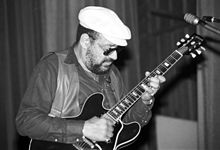Mickey Baker
| Mickey Baker | |
|---|---|

Mickey Baker in concert, 1982
|
|
| Background information | |
| Birth name | MacHouston Baker |
| Born |
October 15, 1925 Louisville, Kentucky, U.S. |
| Died | November 27, 2012 (aged 87) near Toulouse, France |
| Genres | R&B, jazz, rock |
| Occupation(s) | Musician |
| Instruments | Guitar |
| Years active | 1950s–1980s |
MacHouston Baker (October 15, 1925 – November 27, 2012), known as Mickey Baker and Mickey "Guitar" Baker, was an American guitarist. He is widely held to be a critical force in the bridging of rhythm and blues and rock and roll, along with Bo Diddley, Ike Turner, and Chuck Berry.
Baker was born in Louisville, Kentucky. His mother was black, and his father, whom he had never met, was believed to be white.
In 1936, at the age of 11, Baker was put into an orphanage. He ran away frequently, and had to be retrieved by the staff from St. Louis, New York City, Chicago, and Pittsburgh. Eventually the orphanage quit looking for him, and at the age of 16 he stayed in New York City. He found work as a laborer and then a dishwasher. But after hanging out in the pool halls of 26th Street, he gave up work to become a full-time pool shark.
At 19, Baker decided to make a change in his life. He went back to dishwashing, and was determined to become a jazz musician. The trumpet was his first choice for an instrument, but with only $14 saved up, he could not find a pawnshop with anything but guitars for that price.
He enrolled at The New York School of Music, but found the learning pace too slow. He dropped out and resolved to teach himself, but gave up shortly afterwards. Six months later he met a street guitarist who inspired him to start playing again. He continued taking private lessons from different teachers over the next few years. His musical style was influenced by saxophonist Charlie Parker.
By 1949, Baker had his own combo, and a few paying jobs. He decided to move west, but found that audiences there were not receptive to progressive jazz music. Baker was stranded without work in California when he saw a show by blues guitarist Pee Wee Crayton. Baker said of the encounter:
"I asked Pee Wee, 'You mean you can make money playing that stuff on guitar?' Here he was driving a big white Eldorado and had a huge bus for his band. So I started bending strings. I was starving to death, and the blues was just a financial thing for me then."
...
Wikipedia
